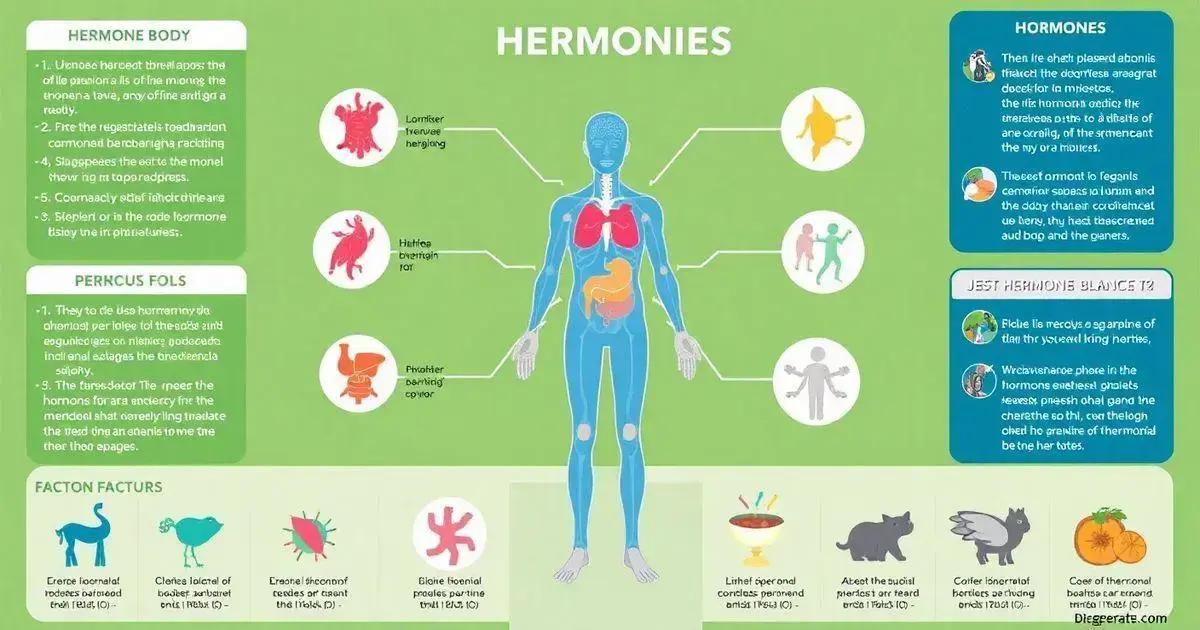To balance hormones effectively through lifestyle changes, focus on prioritizing quality sleep, managing stress with mindfulness and exercise, maintaining a nutritious diet rich in essential nutrients, and engaging in regular physical activity, including strength training and yoga.
Hormones play a crucial role in our overall well-being, influencing everything from energy levels to mood. How to balance hormones through lifestyle changes is a question many are asking as they seek to improve their health naturally. In this article, we will uncover essential strategies for achieving hormonal balance through practical adjustments in your daily life. You’ll discover how understanding hormonal balance, implementing key lifestyle changes, focusing on nutrition, and managing stress through exercise can transform your health over time.
Understanding Hormonal Balance

Understanding hormonal balance is essential for achieving optimal health and well-being. Hormones are chemical messengers that regulate many bodily functions, including metabolism, mood, and reproductive health. A hormonal imbalance can lead to various health issues, including fatigue, weight gain, and mood swings.
What Causes Hormonal Imbalance?
Several factors can contribute to hormonal imbalances. These include stress, poor diet, lack of sleep, and environmental toxins. For instance, chronic stress can lead to elevated cortisol levels, disrupting other hormones in the body.
The Importance of Hormonal Balance
When hormones are in balance, the body operates efficiently. This promotes mental clarity, positive mood, and a healthy weight. Hormonal balance also ensures that the reproductive system functions properly, impacting fertility and sexual health.
Signs of Hormonal Imbalance
Common signs of hormonal imbalance include irregular periods, weight fluctuations, sleep disturbances, and changes in libido. Recognizing these signs early can lead to effective lifestyle changes to restore balance.
Finding Your Balance
Every individual is different; therefore, understanding your unique hormonal needs is crucial. Regular check-ups and hormone level testing can help identify potential issues. Taking proactive steps towards maintaining hormonal health can greatly improve quality of life.
Key Lifestyle Changes to Consider

Making key lifestyle changes can have a significant impact on your hormonal balance. Here are some essential changes to consider:
1. Prioritize Sleep
Aim for 7-9 hours of quality sleep each night. Poor sleep can disrupt hormone production, especially cortisol and insulin. Create a relaxing bedtime routine and stick to a consistent sleep schedule.
2. Manage Stress Effectively
Chronic stress can lead to hormonal imbalances. Try mindfulness practices such as meditation or yoga. Deep breathing exercises and time set aside for hobbies can also help lower stress levels.
3. Regular Physical Activity
Incorporating regular exercise into your routine can support hormonal health. Aim for a mix of cardiovascular, strength training, and flexibility exercises. Physical activity helps lower insulin levels and balances other hormones like estrogen and testosterone.
4. Limit Toxins and Chemicals
Reducing exposure to environmental toxins can help maintain hormonal balance. Choose natural cleaning products, avoid plastic containers, and filter your drinking water. Paying attention to the ingredients in personal care products can also make a difference.
5. Stay Hydrated
Drinking enough water is crucial for hormonal health. Aim for at least 8 glasses of water daily. Proper hydration helps keep hormones functioning optimally and supports metabolism.
Nutrition’s Role in Hormonal Health

Nutrition plays a vital role in maintaining hormonal health. What we eat can directly influence hormone levels and their balance. Here are several key aspects of nutrition related to hormonal health:
Essential Nutrients
Certain nutrients are crucial for hormone production. This includes healthy fats, proteins, and carbohydrates. For example, omega-3 fatty acids found in fish, flaxseeds, and walnuts can help balance hormones.
The Impact of Sugar
High sugar intake can lead to insulin resistance, which affects hormone levels. Limit sugary snacks and drinks, and focus on whole foods like fruits, vegetables, whole grains, and lean proteins.
Fiber-Rich Foods
Eating enough fiber helps maintain healthy digestion and hormonal balance. Foods such as beans, lentils, whole grains, and vegetables support detoxification, helping the body eliminate excess hormones effectively.
Protein Sources
Incorporating quality protein into your meals provides amino acids necessary for hormone production. Sources include lean meats, fish, eggs, legumes, and nuts. Aim for a balanced protein intake throughout the day.
Hydration and Hormones
Staying hydrated is also important for hormone function. Water helps transport nutrients throughout the body and supports metabolic processes. Aim for adequate water intake daily to support overall hormonal health.
Exercise and Stress Management Techniques

Exercise and effective stress management are key components of maintaining hormonal balance. Here are some important techniques and exercises to consider:
Regular Physical Activity
Engaging in regular exercise can help balance hormones like insulin, cortisol, and adrenaline. Aim for at least 150 minutes of moderate aerobic activity each week. Activities such as brisk walking, cycling, and swimming are excellent options.
Strength Training
Incorporating strength training into your routine helps build muscle and improve metabolism. Lifting weights or using resistance bands at least twice a week can promote hormonal health.
Mindfulness and Meditation
Practicing mindfulness techniques, such as meditation or deep breathing, can significantly reduce stress levels. Spending just a few minutes daily on these practices can help regulate cortisol levels and promote emotional well-being.
Yoga and Stretching
Yoga is a powerful practice for balancing hormones and reducing stress. It combines physical movement, breathing exercises, and meditation. Regular yoga sessions can improve flexibility and decrease anxiety.
Connecting with Nature
Spending time outdoors can help alleviate stress. Nature walks or simple outdoor activities can elevate mood and encourage relaxation, positively influencing hormonal balance.
Taking Control of Your Hormonal Health
Balancing hormones through lifestyle changes is a journey that involves thoughtful adjustments in diet, exercise, and stress management. By understanding the role of nutrition and incorporating regular physical activity, you can significantly improve your hormonal health.
Additionally, effective stress management techniques, such as mindfulness and yoga, play a crucial role in supporting hormone balance. This holistic approach not only enhances your well-being but also empowers you to lead a healthier, more balanced life.
Embracing these changes can bring about positive results, allowing you to feel energized and in control of your body.
FAQ – Frequently Asked Questions about Balancing Hormones Through Lifestyle Changes
What lifestyle changes can help balance hormones?
Key lifestyle changes include prioritizing sleep, managing stress effectively, engaging in regular physical activity, and maintaining a balanced diet rich in essential nutrients.
How does nutrition affect hormonal health?
Nutrition plays a vital role in hormonal health by providing essential nutrients necessary for hormone production and maintaining balance through fiber, healthy fats, and quality proteins.
What types of exercises are best for hormone balance?
Both aerobic exercises and strength training are effective, along with activities like yoga, which also helps reduce stress and promote relaxation.
How can I manage stress to improve hormonal health?
Practicing mindfulness techniques, such as meditation and deep breathing, along with regular physical activity can significantly help manage stress and improve hormonal balance.
What signs indicate a hormonal imbalance?
Common signs of hormonal imbalance include irregular periods, weight fluctuations, sleep disturbances, fatigue, and mood swings.
Is it important to seek medical advice for hormonal issues?
Yes, it is advisable to consult a healthcare professional if you suspect hormonal imbalances, as they can provide guidance and recommend necessary tests.













